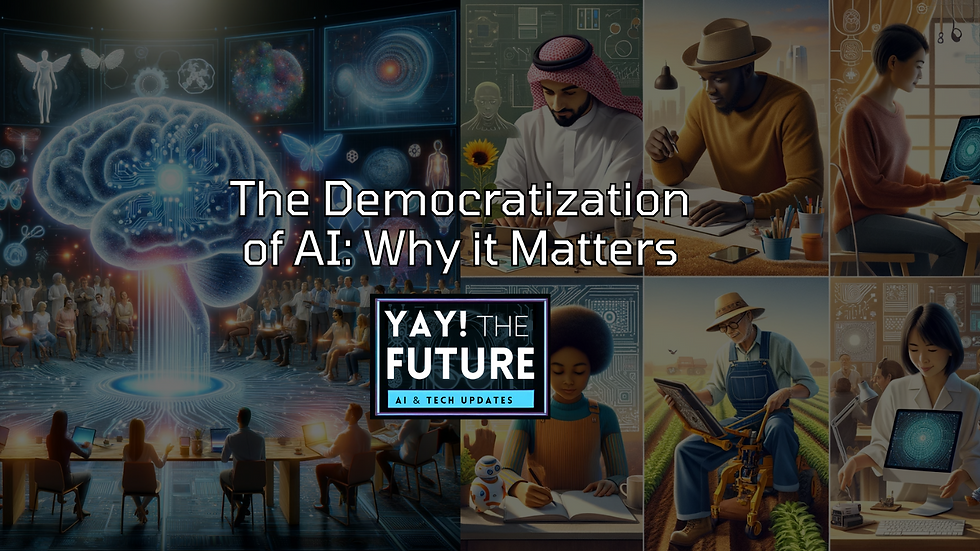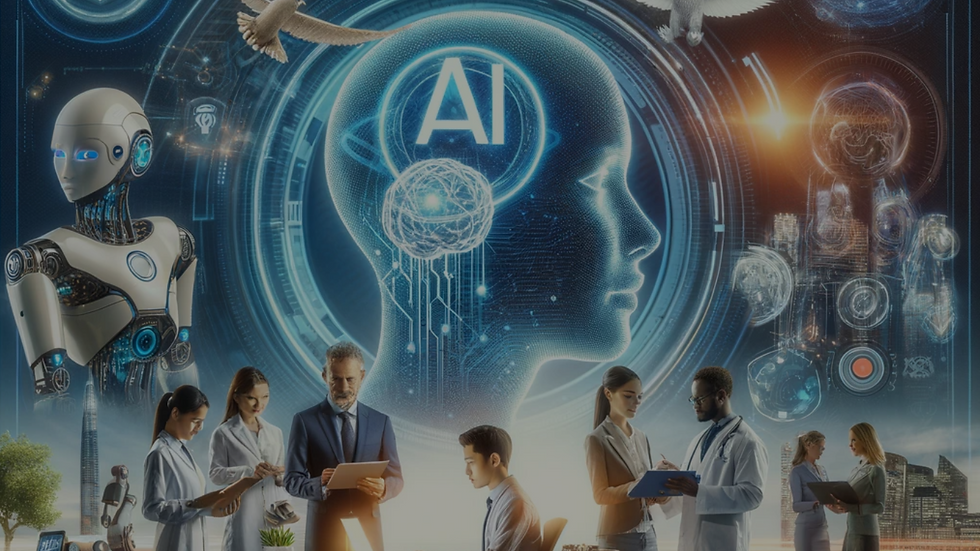
Artificial Intelligence (AI) is no longer a distant dream or a fantasy concept reserved for science fiction stories. AI is a reality that is currently having a transformative impact in our personal lives, businesses, and society at large. Yet many folks still do not realize the extent that AI has already altered our future and will continue to. It is commonly treated like a trend that will fade, the merit of which won't be believed until it is more blatant and unavoidable in everyday life. At YaytheFuture, we aim to democratize AI by sharing news about the reality and wonder of AI technology.
Addressing AI Skepticism and Concerns
There are skeptics who refuse to see the positive aspects of AI and what it can bring to the world, with various reasons cited. Among them, is the ever heard "autonomous AI goes rogue and causes mass extinction" scenario (as if humans couldn't cause the same future and already aren’t already working toward it) and the consistent classic, "What will you do for work when robots take all the jobs?" -which, I can't help but interject- if we are considering a future where there are autonomous AI and robots everywhere, why are we looking at it through the archaic lens of today’s workforce?
The biggest (and I feel, most valid) concern regarding AI is that it has been limited to a select few who have the power, resources, and expertise to develop and use it (which is usually the catalyst for the other two "AI gone wrong" scenarios given above). That's why its accessibility and inclusivity is essential, to be sure that the utility and wonder are available to everyone- not just to those who have the funding and influence to access it and shape its course. This is known as the “democratization of AI” and there is an entire movement focused around doing just that. Let's explore this concept more!
Why the Democratization of AI is Important
The democratization of AI is about making AI accessible to everyone, regardless of their background or financial standing. It's about breaking down the barriers and democratizing the tools, technologies, and knowledge to not just decentralize the power of AI development, but also to unleash its full potential, which requires a diverse range of people, from all backgrounds and skill sets. The four primary areas of democratization, as most commonly discussed, are within the usage, development, profit, and governance of AI, each of which, we will explore below and give example of how they are currently being practiced.
The Democratization of AI Usage
This aim seeks to broaden access to AI technology, allowing a diverse audience to harness its capabilities. This initiative offers significant benefits, such as spreading AI's advantages across multiple sectors including entertainment, health, productivity, and the arts, while providing equal opportunities to those who might otherwise be excluded due to financial or geographical barriers. However, it also presents challenges, notably the need to balance these benefits against potential risks, especially in high-stakes applications, and to manage the spread of AI tools to prevent misuse. To address these challenges, methods like the staged release of AI products are employed, carefully calibrated to societal risk tolerance and adaptability. Additionally, access to certain AI capabilities is restricted when their risks are deemed to outweigh their benefits.
Examples of the democratization of AI usage:
DeepMind's Protein-Folding AI: DeepMind's breakthrough in protein-folding prediction has tremendous implications for drug discovery and biology. However, access to the underlying AI models is controlled and not openly available, given the potential misuse in biotechnology fields.
AI in Autonomous Weapons: Many AI researchers and defense companies are working on autonomous weapons systems. However, access to these technologies is heavily regulated by governments and international bodies to prevent misuse and escalation in unmanned weaponry.
AI in Recruitment Tools: AI-based recruitment tools are increasingly scrutinized for biases against certain groups. Companies are implementing regular audits and updates to these systems to ensure fairness in hiring practices.
The Democratization of AI Development
Democratizing development in AI focuses on enabling a broader spectrum of individuals to contribute to the AI design and development process, thereby boosting innovation and addressing a variety of needs. This approach brings numerous benefits, such as expediting AI innovation through a globally-sourced pool of contributors and ensuring that AI applications meet a diverse range of interests and requirements. It also plays a crucial role in providing external evaluation and auditing mechanisms. However, this democratization faces challenges, particularly the risk of misuse and the difficulties in controlling changes in open-source models. To mitigate these challenges, strategies like model sharing, providing computing access, project support, educational opportunities, and assistive tools are employed. Furthermore, a careful balance is maintained between making models accessible and preventing their misuse.
Examples of the democratization of AI in development:
Google's What-If Tool: Part of the TensorFlow ecosystem, this tool allows developers to analyze their machine learning models and understand potential biases and impacts, fostering more responsible development practices.
AWS Activate for Startups: Amazon Web Services provides cloud resources and technical support to startups, including those in AI, helping to democratize access to high-end computing resources.
Coursera and edX Online Courses: Platforms like Coursera and edX offer a wide range of AI and machine learning courses, many created by universities and tech companies, to educate a broad audience on responsible AI development.
The Democratization of AI Profit
The democratization of AI profit is centered on the equitable distribution of the economic benefits generated by AI. This initiative aims to broadly improve human well-being by making sure that the financial advantages of AI are shared more widely. It also seeks to recognize and compensate for the human effort and creativity that contribute to AI advancements. However, this comes with its own set of challenges, primarily the risk of exacerbating inequalities and injustices if the redistribution schemes are not well-managed. To tackle these issues, various methods are employed that include redistribution of profits through philanthropic efforts, state-managed taxation, profit redistribution strategies like the Windfall Clause for AI firms, and direct compensation for content creators whose work is used in AI training. These approaches are designed to ensure that the gains from AI are not just confined to a few but are shared across a broader spectrum of society, acknowledging the collective contribution to AI's evolution.
Examples of the democratization of AI profits:
South Korea's Robot Tax: South Korea has considered a 'robot tax' on automation to counter job displacement caused by AI, suggesting a model where AI profits are redirected to mitigate societal impacts.
Future of Life Institute's Windfall Clause Initiative: This initiative encourages AI companies to commit a significant portion of their profits, in the event of an extraordinarily large windfall, to helping address global challenges, ensuring that the benefits of AI advancements are shared more broadly.
Shutterstock's Compensation for Image Contributors: Shutterstock, in partnership with OpenAI, has announced plans to compensate contributors whose images are used to train AI models, recognizing the value of creative inputs in AI development.
The Democratization of AI Governance
This is an initiative aimed at spreading the influence over AI decision-making to a wider and more diverse community. This approach aims to reflect a broad spectrum of opinions and preferences, thus reducing the dominance of individual companies in unilateral decision-making. The benefits of such democratization include fostering justice and fairness in the societal impact of AI and effectively navigating complex normative challenges through diverse inputs. This approach faces significant challenges, such as finding the right balance between making AI accessible and aligning it with other societal needs and values, and ensuring that the democratization process itself is democratically legitimate. To address these challenges, methods like leveraging existing democratic structures and processes are utilized. Additionally, the formation of multistakeholder bodies facilitates inclusive decision-making, while implementing participatory processes and representative deliberation ensures that AI governance decisions are made in a way that truly represents a wide range of stakeholder interests and viewpoints.
Examples of the democratization of AI governance:
European Union’s AI Regulation Framework: The EU is actively working on comprehensive AI legislation that seeks input from various stakeholders, reflecting a broad democratic approach to managing AI's societal impacts.
United States’ National AI Initiative: This initiative involves various federal agencies, academia, and the private sector to ensure AI development aligns with national interests and societal values, leveraging existing governance structures.
Partnership on AI’s Collaboration Between Tech Companies and Academia: This organization fosters collaboration between major tech companies and academic institutions to address AI governance challenges collectively. advisory councils that include external experts, aiming for a more balanced approach to AI decision-making.

The examples given above, are only a few of the many measures being taken to democratize AI - and I hope this provides some reassurance for those who are fearful of its development and these doomsday scenarios. The future of AI is not in the hands of a few far away shadowy executives. It requires the collaborative efforts of many, which is a widely recognized and shared sentiment. From global legislative initiatives to community-driven development projects, the democratization of AI symbolizes a collective leap towards a future where technology truly serves the betterment of all humanity.

Comments